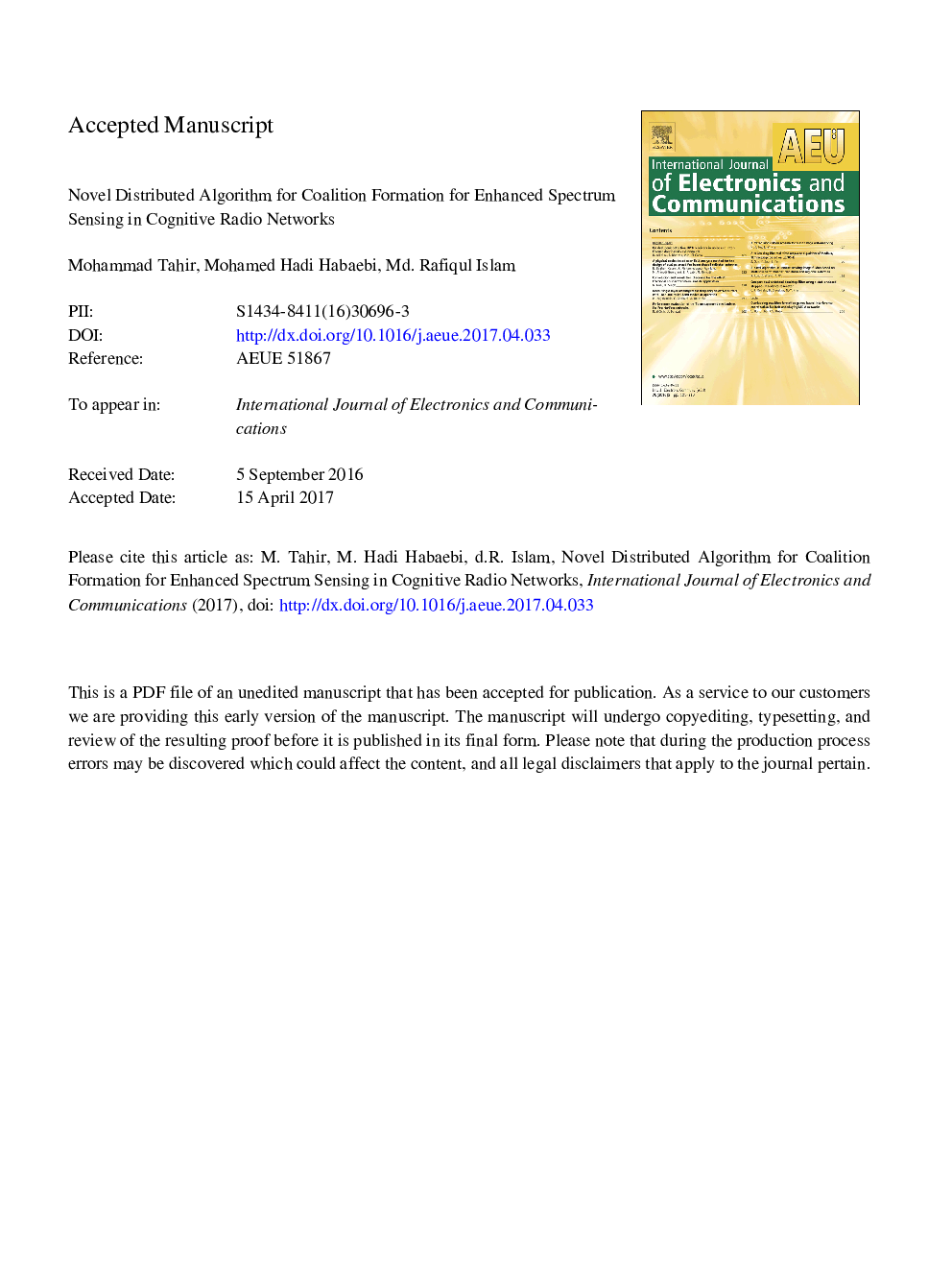| کد مقاله | کد نشریه | سال انتشار | مقاله انگلیسی | نسخه تمام متن |
|---|---|---|---|---|
| 4953912 | 1443123 | 2017 | 16 صفحه PDF | دانلود رایگان |
عنوان انگلیسی مقاله ISI
Novel distributed algorithm for coalition formation for enhanced spectrum sensing in cognitive radio networks
ترجمه فارسی عنوان
الگوریتم توزیع الگوریتم جدید برای تشکیل ائتلاف برای افزایش طیف سنجش در شبکه های رادیویی شناختی
دانلود مقاله + سفارش ترجمه
دانلود مقاله ISI انگلیسی
رایگان برای ایرانیان
کلمات کلیدی
ترجمه چکیده
در این مقاله، ما یک الگوریتم جدید برای بهبود سنجش طیف در شبکه های رادیویی شناختی را با ایجاد ائتلاف ها در میان کاربران رادیو شناختی در محیط کانال محو شده پیشنهاد می کنیم. ما از مفاهیم تطبیق تئوری، بویژه مسئله ازدواج پایدار استفاده می کنیم تا تعاملات میان کاربران رادیو شناختی را به عنوان یک بازی تطبیقی برای سنجش طیف مشترک توزیع شده تحت محدودیت احتمالی تشخیص هدف تعریف کنیم. تابع مفید به عنوان احتمال متوسط هشدار اشتباه در هر کاربر رادیو شناختی تعریف شده است. مزیت ازدواج پایدار این است که همیشه همگام با یک تطابق پایدار است و هنگامی که ترجیحات رادیو شناختی سختگیرانه است، بهترین انتخاب پارتو است. در مدل پیشنهادی، مشکل تطبیق پایدار را گسترش می دهیم تا الگوریتم جدیدی را برای ایجاد ائتلاف های اندازه های مختلف برای بهبود استفاده از رادیو شناختی (زنگ هشدار و بازده کاذب) ایجاد کنیم. ائتلاف های تشکیل شده با استفاده از الگوریتم پایدار هستند و از تطابق نهایی استفاده نمی کنند. ما با استفاده از شبیه سازی هایی که الگوریتم پیشنهادی به ائتلاف های پایدار منجر می شود نشان می دهد و بهبود قابل ملاحظه ای در مدت احتمال کاهش زنگ هشدار کاذب و افزایش توان مصرفی در هر کاربر رادیویی شناختی را نسبت به سناریوی غیر همکاری نشان می دهد.
موضوعات مرتبط
مهندسی و علوم پایه
مهندسی کامپیوتر
شبکه های کامپیوتری و ارتباطات
چکیده انگلیسی
In this paper, we propose a novel algorithm for improving spectrum sensing in cognitive radio networks by forming coalitions among cognitive radio users in a fading channel environment. We use concepts from matching theory, specifically the stable marriage problem, to formulate the interactions among the cognitive radio users as a matching game for collaborative distributed spectrum sensing under target detection probability constraint. The utility function is defined as the average probability of false alarm per cognitive radio user. The advantage of stable marriage is that it always converges to a stable matching and is Pareto optimal when the preferences of cognitive radios are strict. In the proposed model, we extend the stable matching problem to propose a novel algorithm to form coalitions of varying sizes for improving the utility of cognitive radios (false alarm and throughput). The coalitions formed using the algorithm are stable and do not deviate from the final matching. We show using simulations that the proposed algorithm leads to stable coalitions and returns significant improvement in term of reduced probability of false alarm and improved throughput per cognitive radio user as compared to the non-cooperative scenario.
ناشر
Database: Elsevier - ScienceDirect (ساینس دایرکت)
Journal: AEU - International Journal of Electronics and Communications - Volume 77, July 2017, Pages 139-148
Journal: AEU - International Journal of Electronics and Communications - Volume 77, July 2017, Pages 139-148
نویسندگان
Mohammad Tahir, Mohamed Hadi Habaebi, Md. Rafiqul Islam,
